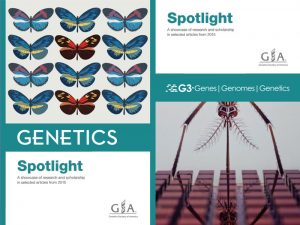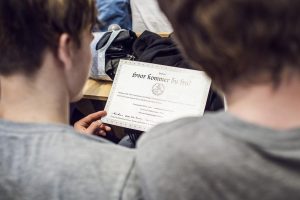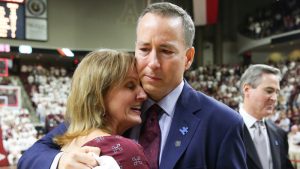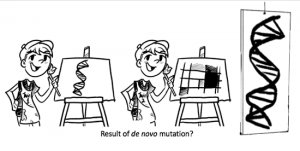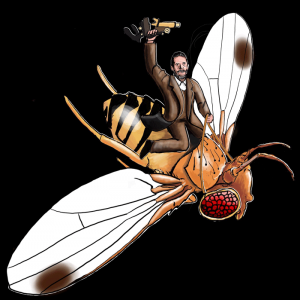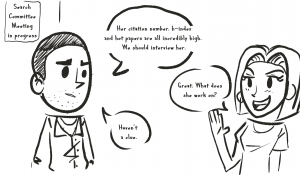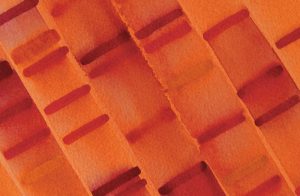Enter your address to receive notifications about new posts to your email.
Featured
-
Featured
That which we call AROSE
I’m a total sucker for new methods. I couldn’t wait to try out Trans-Helical Illumination (THI), in which low intensity lasers prime conversion of helical proteins. The potential of Synthetically Integrative Sensor Neurons (SISN) to probe brain subregion function is inspiring. Closer to my own heart, we have high hopes that Optical Wavelength Assembly of…
-
Featured
GSA-Art: Joanne Topol
Guest post by Joanne Topol. GSA-Art features the creative works of scientists. Read more in GSA President Stan Fields’ call for submissions. If you would like to submit your own work or nominate someone else’s, please send an email to GenesToGenomes@genetics-gsa.org with “GSA-Art” in the subject line. My art reflects inner feelings that cannot be accessed through analytic thought. These feelings are…
-
Featured
GSA Journals Spotlight 2015
The GSA Journals, GENETICS and G3: Genes|Genomes|Genetics, are proud to present our annual Spotlight booklets for research published in 2015. Each Spotlight is a showcase of the excellent research and scholarship published over the course of the year, along with a selection of striking images submitted by our authors. Browse the 2015 GENETICS Spotlight. Browse the 2015 G3 Spotlight. …
-
Featured
Genomic study of high school students from across Denmark reveals remarkable genetic homogeneity
People from Denmark are genetically similar to each other no matter which part of the country they come from, report researchers in the journal GENETICS, a publication of the Genetics Society of America. Eight hundred Danish high school students contributed genetic material to the Where Are You From? project, and the data were used to…
-
Featured
GSA-Art: Barbara Shih
GSA-Art features the creative works of scientists. Read more in GSA President Stan Fields’ call for submissions. If you would like to submit your own work or nominate someone else’s, please send an email to GenesToGenomes@genetics-gsa.org with “GSA-Art” in the subject line. To me, science is not about being in the lab; it is about solving puzzles. I have been working…
-
Featured
GSA-Art: Matthew Sachs
GSA-Art features the creative works of scientists. Read more in GSA President Stan Fields’ call for submissions. If you would like to submit your own work or nominate someone else’s, please send an email to GenesToGenomes@genetics-gsa.org with “GSA-Art” in the subject line. Our first GSA-Art post is by Matthew S. Sachs, a Professor in the Department of Biology at Texas A&M University…
-
Featured
No “two cultures” here: send us your art
I’m fond of saying that while scientists often have a hankering to draw sketches, pen novels, compose songs, or carry out other acts of artistic creation in what available free time they have, you don’t find many creative artists hankering to borrow a bit of lab space for a few nighttime experiments. If you’re a…
-
Featured
Can gene drives survive in the wild?
Efforts to engineer genomes in wild populations have huge potential for good—but the real world is more complicated than the lab. Until now, humans have never been able to seriously consider how to cheat evolution. But now that the CRISPR/Cas9 system has made genome editing easy and efficient, it might be possible to manipulate the…
-
Featured
Happy 150th to a fruit fly wrangler who changed the world
In Kentucky 150 years ago today, a child was born who would—with the help of a hardy inhabitant of trash cans and fruit bowls— grow up to change the world. That boy was Thomas Hunt Morgan. By the 1900s, the energetic young Morgan had become a well-respected expert investigating questions in experimental embryology and animal regeneration.…
-
Featured
Not IF, we can help it
Perhaps no topic has had more ink spilled by biobloggers – especially if you include electrons dripping out of laptops – than the tyranny of the Journal Impact Factor. A metric designed by Eugene Garfield to help librarians select journals, the IF has been routinely abused for purposes never intended. How can we reverse this…
-
Featured
Hubby & Lewontin: Problems and Conversations
The beautiful cover of the August issue of GENETICS was created by artist Michele Banks to commemorate the fiftieth anniversary of a pivotal moment in the history of evolutionary biology: the 1966 publication of a pair of GENETICS papers using protein electrophoresis to reveal that natural genetic diversity is bountiful. Thanks to a conversation between…



